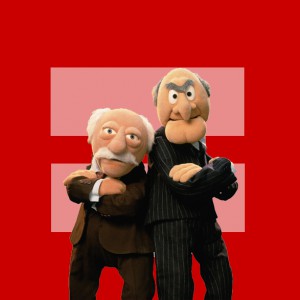
I’d like to commence this line of argument by acknowledging a philosophical opponent to marriage equality who – according to his face-book profile – has the nomenclature of “Greg Rams”. I have argued with or responded to opponents whose arguments are fallacious and absurd such as Senator Eric Abetz’s article or fabricated like the “natural marriage” petition being distributed in Mackellar, via Parliamentary Speaker, Bronwyn Bishop in recent times. Greg actually presented a researched argument that made me “work”. While we sat on opposing philosophical seats in regards progress on marriage equality – initially I assumed pretentiousness based on previous experience with others and a misunderstanding of his perspective. Instead, I grew to respect and find merit in his opposition even in disagreement. As such, I quote him directly herein. Having said that, I want to explore the definition historically of marriage that we ended up discussing and that has inspired this post.
There is very naturally, an instinct to acquiesce to the biblical origins of marriage in the Western world. Intriguingly the definition of marriage from a biblical perspective has undergone radical and – by today’s standards – disturbing changes, specifically concerning its early history. I will although, come back to these later.
It is the contemporary historical changes (i.e. the last couple of centuries) that have and seen the most radical changes in its purpose and meaning for western society. Prior to that in Western and Eastern cultures, a marriage ceremony served a purpose for the elite of society and was rarely entered into amongst the hoi polloi. In fact, in many ancient cultures, there is no evidence of marriage ceremonies, but rather at best a contractual agreement often involving money, power and survival. In fact, the early Church had no marriage ceremony until the 9th century and didn’t include a priest till the 12th Century. Peg Helminski’s blog on “Redefining Marriage” has a brilliant opener (right from the first sentence) about how marriage was defined.
In the beginning…
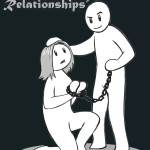
“In the beginning, marriage was a relationship between two men. A man exchanged goods or services with a girl’s father to procure a virgin bride who likely became one of several wives. This way, he could assure himself that any children he supported held valid claim to his property. Yes, marriage began as a business transaction to assure male property rights. Often, marriage provided other benefits; increasing the family labour force, acquiring a trade agreement or securing a political alliance.”
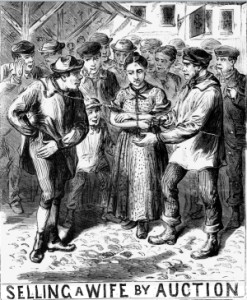
Until the 18th century, western society continued to view “marriage” as a property settlement issue and to frame it in the terms the famous jurist William Blackstone, gave us: “By marriage, the very being or legal existence of a woman is suspended, or at least incorporated or consolidated into that of the husband, under whose wing, protection, or cover she performs everything.” Is it no wonder that by the late 18th century the analogy of “slavery” to define a woman’s compliance with the terms of marriage was invoked by both English and European women.
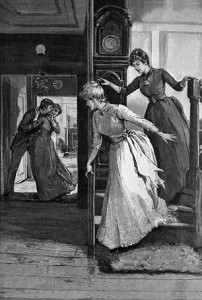
It was only historically recently, in the 19th century, that there slowly emerged a representation of marriage as a romanticised concept by women, and even occasionally, men. Prior to these centuries, before the Enlightenment and Victorian eras, men found more passion in adultery and friendship, than in marriage. Eventually the relationship of marriage moved from the concept of a property settlement – often not between direct parties to the marriage – to involve courtships between the actual participants in the marriage. Although, always encompassed within the patriarchal confines of western or eastern civilisations desire for men to hold the primary authority within the relationship. Historically, it was capitalism and its invocation of motivations for inspiring men to don their battle apparatus for “war” or “work”, that was significantly responsible for redefining what “marriage” was.
The Capitalist need for “romance”.
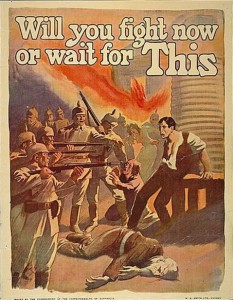
In a world of increasing production and the need to protect the State, in western economies, it was necessary to convince otherwise authoritarian, independent and autonomous men to risk their lives in defence of the State. Patriotism by itself, was never as strong a motivator, unlike the perception – built by the State’s propaganda – that men were defending private interests, property, domestic relationships and dependants.

Hence the old catch cry of the “enemy” advancing on your farm or home or even hiding under your bed ready to spring upon your family and do them ill. Still very much a tactic used in contemporary Australian political manipulations, as seen by the concentration of dialogue and finance, dedicated to the apparent threat of “jihadist” terrorism from overseas. Even though it has resulted – in the last century – in so few lives lost in Australia, that its real affect is negligible by comparison with any other rarely occurring event that results in loss of Australian lives. But I divert from my subject …
Capitalism also required increasing growth in production and economic output by encouraging men to slave their days away for their corporate masters in support of their family. Capitalism required the formerly autonomous man, who held his family as little more than chattels he owned and could dismiss, to develop emotional ties and motivation. These were targeted towards providing for the continuance of the family, depending on always, upon his work and earning capacity to survive. Incentivising a man to work relentlessly towards greater prosperity for the sake of his family, needed that family, to be something more than private chattels. Marriage had to be redefined in terms of emotional commitments by the individuals. Thus did a societal impetus, egged on by the propaganda of the age, begin to redefine marriage again so that men, women and their children played a role in the extension of capitalist western society. To quote the series on Marriage and Women by cyber parents : “Doing it for my family” thus produced the perfect capitalistic male and the perfect supporting cast “his women and children.”
Feminine independence.
One of the threats to “traditional marriage” (the sale and subservience of women) was the emerging capacity for women’s independence, from the economic domination of men in marriage. This began in the Western world during the industrial revolution, when the textile mills recruited thousands of women into the workforce. While certainly the wages paid were minuscule – in comparison to that paid to their fathers and husbands – it did provide for the first time, freedom from the controlling influences of the patriarchal oppression. Henry Ford’s decision in the early 1900s to commence playing his workers “a fair wage” – including some (but not all) of the women who worked for him – in order to starve off the turnover of his staff. It became, unexpectedly, the impetus for significant social change. [But please let’s not pretend it was for Ford’s claimed altruism so his workers could afford his cars.] Diverting again…
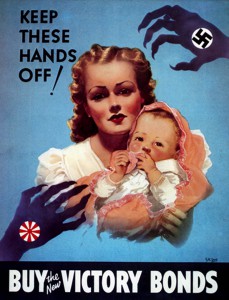
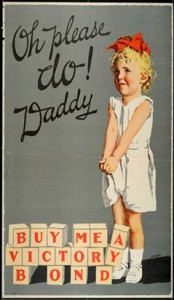
Fortunately for capitalism, that social change was effective in motivating men to enter the First World War to be seen to be protecting the dependants back home from the “Gerrys” who would otherwise be climbing up from beneath their beds. With women acquiring the means for increasing independence, the patriarchal model of control of the family unit was under threat. Men had to “step up” to demonstrate that they were willing to “fight” for this new definition of “marriage” in the post-industrialised world. [Certainly didn’t the war propaganda machine milk that one!]
Women’s empowerment and, ultimately, social and economic independence came through the feminist campaigns of the 19th and 20th centuries. Marriage as an instrument of an expression of “love” – as opposed to it’s far longer history of ownership, inheritance and power – is a very recent reinvention of the concept, historically speaking. The idea of “marriage” has always been an evolving and developing concept. Holding onto a particular view of loving heterosexual marriage, needs to consider the possibility that it reflects that you are a product (or victim) of your current cultural conditioning. One that was built on an older background underlying your current culture, fed from capitalist manipulations that probably pre-date you. It is a view that inherently neglects or denies the reality – that as a concept – “marriage” as we know it, is a recent reinvention. In truth, marriage has had a far longer history as a tool of patriarchal oppression, ownership, violence and power.
Heterosexual advantage
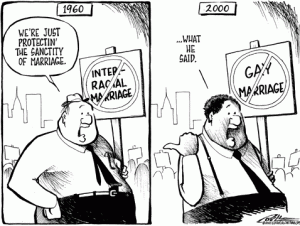
Towards the end of the 20th and certainly into the 21st century the battle lines have changed about how we as a society define the word “marriage” and who we might concede it is available to. In recent history the non-heterosexual community has raised the societal consciousness that “marital rights” have been denied as a choice. Despite there being a growing and now wide acceptance in the 21st century for gay couples and their families ( including children) to have an established presence. It has although, a limited legal recognition in Australia, and we have continued to deny legal marital choice. Across the globe, Marriage Equality has recently produced significant global headlines with the decision by the American judiciary and the referendum in Ireland. So where other democracies in the western world have ceased to deny this marital choice, in Australia it has continued to demonstrate its recalcitrance.
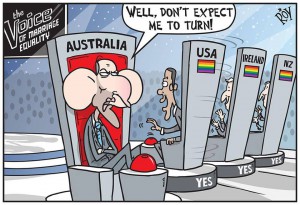
As the Libertarian associate with whom I had previously argued, pointed out, the legal protections for de facto relationships in Australia are also applicable to gay relationships in theory, although, unfortunately not so much in practice. The issue of evidence necessary to establish that a homosexual relationship exists has impact on access to numerous legal rights and recognition. These are of course is readily available to legally married partners with a marriage certificate. These access limitations – and while some of them may indeed be provided for through the legal protection afforded to de facto relationships – in practice are still subject to social bias and hostility within the more conservative community that often limits (sometimes “illegally”) access to the following:
- Right to marry / right to divorce
- Hospital visitations
- Child custody rights
- Adoption rights
-
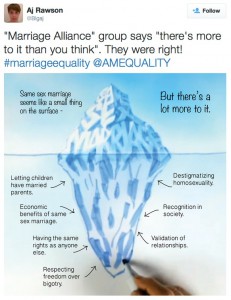
Much injustice to be resolved normally shoved under the water Parenting rights
- Automatic inheritance
- Divorce protections
- Employment equality
- Immigration law
- Medicare
- Retirement plans
- Social security benefits
- Survivor benefits
- Freedom of gender expression
- Spousal and child support
- Federal taxes / joint taxes
- Legal protection from gender-identity-based discrimination
- Exemption from property tax upon death of a spouse
- Legal protection from discrimination based on sexuality
- Health insurance continuation of health coverage
- Medical decision-making power on behalf of a spouse
- Legal protection from housing discrimination
- Right to free expression and free association
- Right to medial coverage and safe access to care
- Standing to sue for wrongful death of a spouse
- Access to equal education
- Access to family insurance policies
- Domestic violence protections
- Rights to form a family
Now as my libertarian opponent with whom I have previously argued, rightly pointed out, some of these issues do have the protection of de facto relationship laws. But not all, and in Australia it is dependent on which state you live in as to what protections you can access and when you can access them. He also said of the list above: “There were other things you mentioned which are largely based on societies perceptions. Yes it would be good if society could see through these.” While I agree with him in principle, the predominant problem of course is, that the interface for access to these legal protections are often people. Individuals in society who quite frankly do not “see through these“. The dogmatic and disapproving front-line officials (egged on by our leadership examples of ultraconservative prejudice) instead present obstacles to access, built out of their own judgements against the LGBTQ community. Dubiously illegal and/or immoral, though it may be, it is the experience expressed anecdotally by friends frequently in their community.
De facto relationships are not married ones. For example, the 1942 Act that defines “de facto relationship” states: “De facto relationship means the relationship between two unrelated adult persons:
- Who have a mutual commitment to a shared life, and
- Whose relationship is genuine and continuing, and
- Who live together, and
- who are not married to one another.”
Interestingly I imagine any of us can envisage two people still being legally recognised as married but have none of the top three conditions being met.
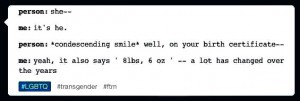
But it is not merely about access to legal protections. One of the legal discriminations practised against the transgender community is the wilful intent to bring about the termination of a couple’s marriage irrespective of their wishes. The legal requirement that forces divorce upon a couple where one partner seeks to have their birth certificate ratified under their new gender assignment, is unnecessarily cruel as is the requirement to have undergone risky surgery to have their sex identified on their Government records. Legal “marriage equality” means these couple’s retain a marriage that continues to be legal and their choice.
Continuing patriarchal protectionism in the 21st century
If the concept of marriage has evolved to the point where it is acceptable to be the expression of consensual love between two parties, rather than an exchange of consideration and chattels, why indeed, is it only available where those two parties are of the opposite sex? In truth, it’s about continued protection of the patriarchal model. If you have not stopped and read the article by Peg Helminski by now, then I would suggest you do so. It will assist you to understand what it is “the male patriarch” is still committed to protecting for itself. I am not going into that here, as I think her article is excellently thought out and her blog should be read.
Married or Happy?
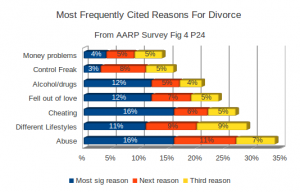
Why in the world does this particular word – “Marriage” – need to be guarded against being used by people who want to declare their love for one another? Especially in the midst of a particular demographic (i.e. Heterosexuals) who perchance treat it with the utter disrespect that they do? That disrespect emerges through rampant adultery, domestic economy abuse and the proliferation of divorce that permeates our western society! The flip side of the equation is indeed there are people who do honestly wish to treat marriage respectfully. Yet statistical inferences demonstrate that amongst heterosexuals in the western world the divorce rate has climbed, as has both the remaining number of unhappy marriages and the happiness of single women. In fact, “marriage” has garnered such a unpopular reputation that many women would rather raise children without the assistance of a male partner. The statistic on this used to be 37% in America, although with reduced support for single mothers, particularly under our LNP government, it is possible that Australian women are not following America’s lead in such huge numbers. It is true though that they are indeed still resisting entering matrimony. The resistance in Australia to entering into marriage – especially early on – and the rise of de-facto relationships may account for the fact that the crude divorce rate in Australia has dropped marginally. Add on to that, the issue of domestic violence associated with Australian marriages, and the very suggestion of “marriage” is suffering a massive “public relations” backlash. All of this leads one to the conclusion, that opening the definition of “marriage” to accept and provide access to the LGBTQ community might create a new and possibly positive paradigm. Although as Greg said to me: “Changing the definitions of words will not bring definitive change“. In fact the personal slogan he reiterated to me was: “To create equality via definition does not bring definitive equality.” While a logical truism, does that mean it is applicable. “Marriage” will indeed still suffer from the abuse the heterosexual community inflicts upon it. I do not, although, believe we should surrender hope for the idealistic potential of marriage but instead strive as a community to support those engaged in it as well as those who choose not to participate. In short, he may be right, but I hope he isn’t. In fact, given the positive direction “marriage” has been developing into over the last couple of centuries, there is good cause to hold out hope.
Holy marriage?
Heterosexuals respect for the “holy traditions” of marriage as were referenced by Senator Eric Abetz as existing over a “millennia and across civilisations” ignores the fact that what marriage is, is very different to what it was. [Incidentally historically his claim is incorrect as Gay marriage was very much a part of older civilisations, but never let it be said that the facts should get in the way of a good argument.] In truth “marriage” as we know it has neither traditions of a long history nor ones you could describe as terribly “holy”. Marriage is continually undermined by the hypocrisy in which so many of us fail to take seriously the legal or religious vows made as they exist now. That being: “a union between a man and a woman, to the exclusion of all others, for life”. Indeed faithfulness to one’s partner and the longevity of the marriage relationship is often in short supply in contemporary society. Isn’t it about time that the definition became: “a union between a two people, to the exclusion of all others, for life“, as that will radically change the respect given to the institution and possibly even demonstrate that the people who have fought long and hard for the right to be married, actually may demonstrate more respect for the “holy traditions of marriage“. Certainly more than the particular group who have held exclusive access to it to date!
Religious obscuration
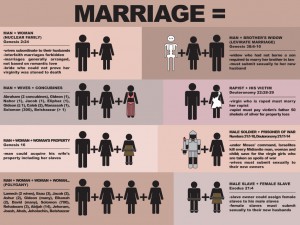
Of course for the religiously affiliated amongst us, there is the illusion fostered by the Church of what is known as a Biblical concept of marriage that many conservatives feel the need to defend. That particular theory also leans heavily towards the patriarchal model in which a woman surrenders herself to the will and authority of man. To counterbalance this position, the church goes to some length to point out it is commensurate upon the man to demonstrate love in the same way in which God does for the church and therefore not abuse his position of “authority”. [Yeah umm … good luck with that.] There is of course, a desire on the part of the churchgoing religious community, to avoid discussions in regards the Old Testament’s evolving view of marriage. The position adopted, is that the New Testament proclamations, override that of the Old Testament. This despite the claim by Christ that saw himself differently when he said “Do not think that I have come to abolish the Law or the Prophets; I have not come to abolish them but to fulfil them.” That is not to say there are not reasons to justify overriding aspects of the Old Testament law, I am just saying that it is not as Black and White as some literalists would have you believe. Gray is the new Black or as the Apostle Paul said, “it is the spirit not the letter of the law”. Lets face it, if the church didn’t take that position, than what they would be left with as a definition of marriage? Certainly one that would have to include how radically and brutally offensive to the modern sensibility, the concept of Marriage was. If perhaps you don’t know what I’m talking about, I think I will leave it in the hands of the satire of Mrs. Betty Bowers, “America’s Best Christian”, who will explain it succinctly and brutally in her YouTube clip. <– Click anywhere on the previous sentence unless you are a Christian who is too easily offended (and don’t say you were not warned).
Knock, and the door will be opened!

“Marriage” by definition has, over the centuries, continued to evolve to be something more desirable and more inclusive for all. The path to “marriage equality” is a continuation of that trend for its ongoing evolution and improvement of society. If the LGBTQ community, can demonstrate to the heterosexual community – who have traditionally abused it – that marriage by definition should be positive and life affirming, then why should we deny them the opportunity to make it so. Australia needs to be open to the possibilities of a better definition of “marriage” that gives hope and strengthens commitment. Perchance the LGBTQ community may choose our 2nd hand, battered and bruised concept of “marriage”, and remake it into something we can look upon with pride. Perhaps then, we can actually put it back on the pedestal, that many have always imagined, that it sat on.